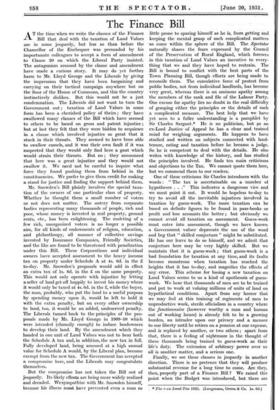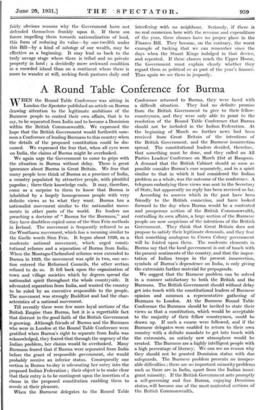The Finance Bill
AT the time when we write the clauses of the Finance Bill that deal with the taxation of Land Values are in some jeopardy, but less so than before the Chancellor of the Exchequer was persuaded by his importunate colleagues to accept a form of amendment to Clause 20 on which the Liberal Party insisted. The antagonism aroused by the clause and amendment have made a curious story. It may do yet further harm to Mr. Lloyd George and the Liberals by giving the impression that they have been bargaining and carrying on their tactical campaign anywhere but on the floor of the House of Commons, and this the country -instinctively dislikes. But this would not be a just condemnation. The Liberals did not want to turn the Government out ; taxation of Land Values in some form has been a cherished policy of theirs ; they have swallowed many clauses of the Bill which have seemed to others to be based on gross and patent injustice ; but at last they felt that they were bidden to acquiesce in a clause which involved injustice so great that it stuck in their throats. They seemed to have been able to swallow camels, and it was their own fault if it was suspected that .they would only find here a gnat which would_ strain their throats. But no ; they announced that here was a great injustice and they would not swallow it. We need not be careful to inquire what force they found pushing them from behind in the constituencies. We prefer to give them credit for making a stand for justice and finding the support behind them.
Mr. Snowden's Bill plainly involves the special taxa- tion of the owners of one particular class of property. Whether he thought them a small number of voters or not does not matter. The outcry from corporate bodies representing many thousands of people, rich and poor, whose money is invested in real property, ground rents, etc., has been enlightening. The mulcting of a few rich, unorganized voters is no longer a possible aim, for all kinds of endowments of religion, education, and philanthropy, all manner of collective savings invested by Insurance Companies, Friendly Societies, and the like are found to be threatened with penalization under this Bill. These Corporations and individual owners have accepted assessment to the heavy income tax on property under Schedule A at 4s. 6d. in the £ to-day. Mr. Snowden's proposals would add in effect an extra tax of ls. 8d. in the £ on the same property. This would not only operate with injustice by letting a seller of land get off happily to invest his money where it would only be taxed at 4s. 6d. in the £, while the buyer, the man, probably,-who put the land to a useful purpose by spending money upon it, .would be left to hold it with the extra penalty, but on every other ownership to land, too, it would be an added, undeserved penalty. The Liberals turned back to the principles of the pro- posals made by Mr. Lloyd George in 1909-10 which were intended (clumsily enough) to induce landowners to develop their land. By the amendment which they handed in one unit of Land Values was not to bear both the Schedule A tax and, in addition, the new tax in full. Fully developed land, being assessed at a .high annual value for Schedule A would, by, the Liberal plan, become exempt from the new tax. The Governmeht has accepted a compromise here, and the Liberals may congratulate themselves.
But the compromise has not taken the Bill out of jeopardy. Its likely effects are being more widely realized and dreaded. We sympathize with Mr. Snowden himself, because his illness must have prevented even a man so little prone to sparing himself as he is, from getting and keeping the mental grasp of such complicated matters • as come within the sphere of the Bill. The Spectator naturally shares the fears expressed by the Council of the Preservation of Rural England, which foresees in this taxation of Land Values an incentive to every- thing that we and they have hoped to restrain. The Bill is bound to conflict with the best parts of the Town Planning Bill, though efforts are being made to reconcile them. The cumulative force of protest from public bodies, not from individual landlords, has become very great, whereas there is an ominous apathy among the members of the rank and file of the Labour Party. One excuse for apathy lies no doubt in the real difficulty of grasping either the principles or the details of such a complicated measure. The best help that we have yet seen to a fuller understanding is a pamphlet by Sir Charles Sargant.* He is no politician, but as an ex-Lord justice- of Appeal he has a clear and trained mind for weighing arguments. He happens to have studied and written on subjects connected with land- tenure, rating and taxation before he became a judge. So he is competent to deal with the details. He also writes with knowledge of the history, and has studied the principles involved. He finds ten main criticisms and objections to the Tax. We cannot quote them here, but we commend them to our readers.
One of these criticisms Sir Charles introduces with the words : " The tax is ascertainable on a -number of hypotheses . . ." This indicates a dangerous vice and we must point it out. It would be hopeless to-day to try to avoid all the inevitable injustices involved in taxation by guess-work. The more taxation can be based on definite figures to be found in pass-books or profit and loss accounts the better ;_ but obviously we cannot avoid all taxation on assessment. Guess-work must enter into assessment, though we have known a Government valuer deprecate the use of the 'word and beg that " skilled conjecture " might be substituted. He has our leave to do so himself, and we admit that conjecture here may be very highly skilled. But we maintain that it is guess-work ; that guess-work is a bad foundation for taxation at any time, and its faults become monstrous when taxation has reached the heights that it has to-day, and magnifies the effects of any error. This scheme for basing a new taxation on Land Values seems to us a kind of apotheosis of guess- work. We hear that thousands of men are to be trained and put to work at valuing millions of units of land on hypothetical conditions. Apart from any •horror that we may feel at this training of _regiments of men to unproductive work, sterile officialism in a country where the fonctionnaire (however worthy a man and human out of working hours) is already felt to be a growing burden, an intruder upon our privacy and a menace to our liberty until he retires on a pension at our expense, and is replaced by another, or two others ; apart from that, there is a feeling of nightmare in the thought of these thousands being trained to guess-work as their life's duty: The extension of arbitrary power over us all is another matter, and a serious one.
Finally, we see these clauses in jeopardy in another direction. There is no pretence that they will produce substantial revenue for a long time to come. Are they, then, properly part of a Finance Bill ? We raised this point when the Budget was introduced, but there are * The ew Land Tax 1931. (Longman, .Green & Co. ls. 6d.) fairly obvious reasons why the Government have .not defended themselves frankly upon it. If there are forces impelling them towards nationalization of land, this form of reducing its value—by 'one-twelfth under this Bill—by a kind of sabotage of our wealth, may be effective as a beginning. It may lead us back to the truly savage stage where there is tribal and no private property in land ; a decidedly more awkward condition in a crowded island than on a continent where there is room to wander at will, seeking fresh pastures daily and interfering with no neighbour. Seriously, if there is no real connexion here with the revenue and expenditure of the year, these clauses have no proper place in the Finance Bill. They become, on the contrary, the worst example of tacking that we can remember since the days when the Stuart Kings indulged in that device, and repented. If these clauses reach the Upper House, the Government must explain clearly whether they regard them as political or as part of the year's finance. Thus again we see them in jeopardy.











































 Previous page
Previous page